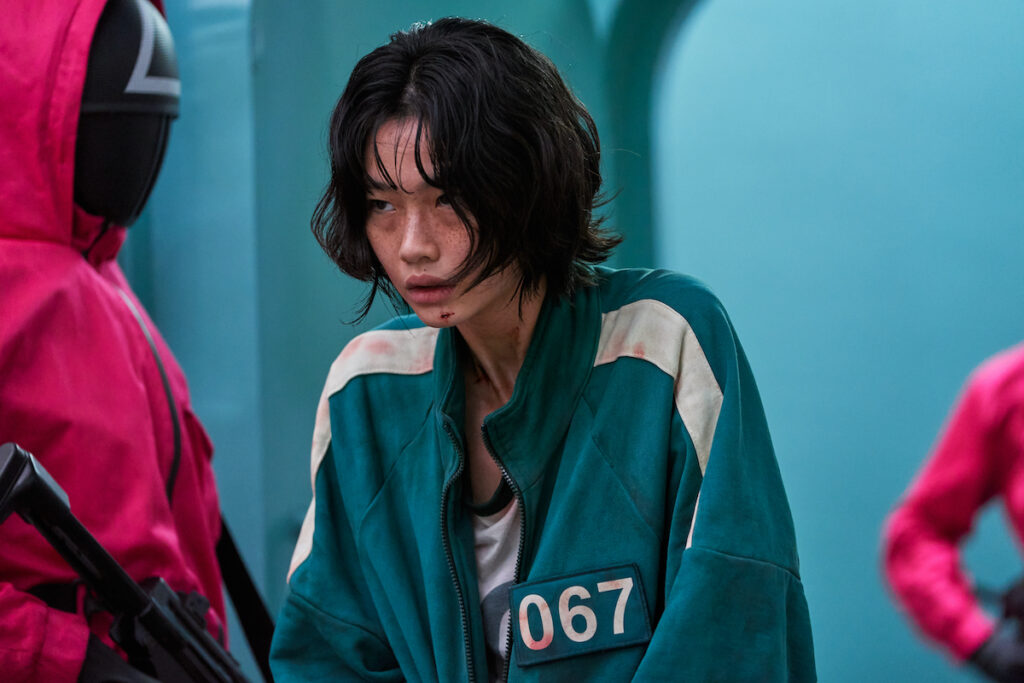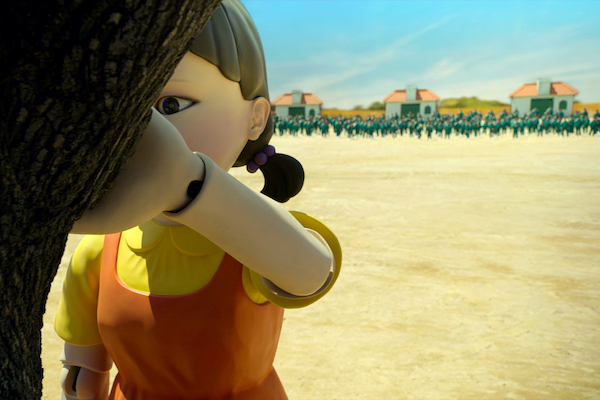
The series “Squid Game”, which is on track to becoming the most popular show ever on Netflix, is not only a highly addictive survival drama, but also exposes the dark side of Korean society hidden beneath the shiny exterior of K-pop, K-dramas, and Hallyu (Korean Wave).
The show itself is a product of this soft power strategy of South Korea. As well as of the world’s insatiable hunger for Korean content — on which Netflix has invested almost US$500M this year. Just as “Parasite” tackled social inequality in the country, so too does “Squid Game” examine the ugliness of Korean society.
In this bizarre contest, desperate people risk their lives playing deadly versions of children’s games for 45.6 billion won (approximately US$39 million). As a microcosm of South Korea, “Squid Game” shows how the worst aspects of Korean society, including racism, misogyny, and fake meritocracy, have shaped the characters and their treatment of each other.
Better dead than poor
If “Parasite” has taught us anything, it’s that you might be better off being dead than poor in South Korea. The main character in “Squid Game” is Seong Gi-hun (Lee Jung-jae). He is a chauffeur and gambling addict, who has accumulated so much debt.
We learn that a car manufacturing company had laid off Gi-hun and his fellow workers. This sends his life into a downward spiral. While they are striking, his then pregnant wife goes into labor. She almost loses the baby, after being forced to go to the hospital by herself. She eventually divorces Gi-hun and gets custody of their daughter.
After he loses his job, Gi-hun tries to start a restaurant business, which fails. He struggles to make ends meet and is not even able to pay for alimony and child support. In fact, he lives with his mother, from whom he steals money that he uses to gamble. He keeps hoping to win big, but instead ends up deeper in debt.
Till debt do us part

“Squid Game” neither romanticizes the poverty that Gi-hun experiences nor tries to portray him as a noble character. As shown by his treatment of his mother, he doesn’t have any scruples about lying and stealing to have money to gamble. It’s also unclear how much he loved his wife, because it’s unfathomable why he would choose to join the strikers instead of staying with his pregnant wife who could go into labor at any time.
In a way, Gi-hun is resigned to his lot in life, because he is not smart enough to qualify for a good school like his childhood friend, Cho Sang-woo (Park Hae-soo), a gifted student who is the pride of his mother and the neighborhood because he was able to go to Seoul National University. As we know from K-dramas like “Sky Castle”, getting into the right school can determine whether you will succeed in a hierarchical society like South Korea.
Gi-hun, who looks up to the younger Sang-woo and is envious of the life he has made for himself, is shocked when they become two of the 456 desperate people who join the contest. It turns out that Sang-woo squandered his good education and high-paying job as head of the investment team at a securities company because of greed. He did not just trade in stocks, but also in risky futures, and fell deep into debt. Later it is revealed that he is wanted by the police for stealing money from his clients, and that he has also used his mother’s house and store as collateral.
North to South

The third main character in “Squid Game” is Kang Sae-byeok, a North Korean defector played by model-turned-actress Jung Ho-yeon. This is her first acting role, and she has become the show’s breakout star, whose popularity was also helped by being known as the best friend of BLACKPINK member Jennie.
Sae-byeok, the Pakistani migrant worker Abdul Ali (played by Indian actor Anupam Tripathi), and Ji-yeong (Lee Yoo-mi) are my favorite characters in “Squid Game”.
Incidentally, a Filipino actor and English teacher in South Korea, Chris Lagahit (also known as Chris Chan), is in “Squid Game” as Player 276. You may also recognize him from Korean vlogger Jessica Lee’s video that tackles racism against Filipinos in South Korea.
Boss from hell
“Squid Game” has resonated with the self-employed in South Korea, according to this Korea Times article on how structural problems in Korean workplaces drive people to self-employment.
He said that Korea’s hierarchical work culture also prompts people to turn to self-employment.
“‘As the hierarchy is very rigid in companies, workers often experience unjust gapjil from their bosses. They come to think, Maybe I should be my own boss,’ he said, explaining why Korea has so many small merchants. ‘Gapjil’ is a Korean term that refers to the authoritarian behavior on the part of a person in power towards people on the weaker end of a power relationship.”
Racism kills
Apart from the abusive behavior of people in power, racism is also a big problem in South Korea.
“Another respect is in migrant labor, especially unskilled workers from developing countries. They are basically on a temporary visa, have little legal protection, and face a great deal of discrimination. Lower-class ethnic Koreans from China and North Korean defectors are also looked down upon, even if they belong to the same Korean nation. There is a gap between perception and reality. While they are told that they belong to the same nation and ethnicity, in reality, what really matters is class. Class matters much more than ethnicity, nationality, or even citizenship in practice. Foreign brides, migrant workers, and North Korean defectors are treated much poorly in South Korea than say, middle-class Korean-Americans or professionals from developed countries.”
We see this in how Sae-byeok struggles to survive because she is discriminated against as a North Korean defector. Different people have betrayed and swindled her. So she has learned to trust no one, surviving by becoming a pickpocket.
Caste in stone
Ali not only experiences discrimination as a migrant worker, but also because of the unspoken “caste” system in South Korea, which is based largely on race and skin color.
Kim’s map puts Koreans and ethnic Koreans living outside of Korea at the top, followed by ‘honorary Koreans’: East Asian immigrants, light-skinned Central Asians, people of mixed Korean and East Asian descent, people of mixed Korean and European descent, and light-skinned non-Koreans.
At the bottom of the map is a group dubbed ‘collective dark,’ which consists of South and Southeast Asian immigrants, Middle Easterners, dark-skinned non-Koreans, people of mixed Korean and Southeast Asian descent, people of mixed Korean and Black descent, and Black people.
Gospel of misogyny
The misogyny of South Korea, where feminism is a dirty word, is in full display in “Squid Game”, where the players discriminate against women and old people.
It’s not just the despicable gangster Jang Deok-su (Heo Sung-tae) who is an unabashed misogynist. Take Player 244 (Kim Si-hyun), a Christian pastor who rediscovers his faith during the contest. Player 244 even cites the Bible, saying God created Eve from one of Adam’s ribs.
This, he claims, shows men and women are not equal and have different parts to play. To which Ji-yeong replies: “This isn’t the Garden of Eden”.
Fake meritocracy
The biggest critique of Korean society, however, is the supposedly meritocratic game itself. The Front Man even claims that a “fair world” exists inside the game. One where every player competes on equal footing. One that makes up for the injustices that have ruined their lives and made them this desperate.
This is a fake meritocracy, however, in the same way a racist and hierarchical society rigs the game against outcasts. In the first place, we see how corruption undermines the supposedly fair system. But even without those corrupt individuals, the system itself is not fair.
The mechanics for the childhood games often mean dumb luck will undermine skill. For instance, picking the wrong shape in one practically guarantees failure, while going first in another could mean instant death.
Here we are now
Moreover, The Front Man blatantly manipulates one game to prevent a player from winning because of an unexpected skill. Just to add to the entertainment value because the VIPs were complaining.
This “fair world” does not exist to give players the chances the world has denied them. Instead, the goal is to entertain the VIPs. It is, as the Front Man will say, a horse race. Where the players are the horses.
What kind of hellish existence do outcasts have to endure, for them to willingly choose to kill or be killed?
Maybe reality is even worse than “Squid Game”.


Pingback:Lisa's braids did not offend them, say Black YouTubers - Digital Life Asia
Pingback:'Alice in Borderland': Living is more than just surviving - Digital Life Asia